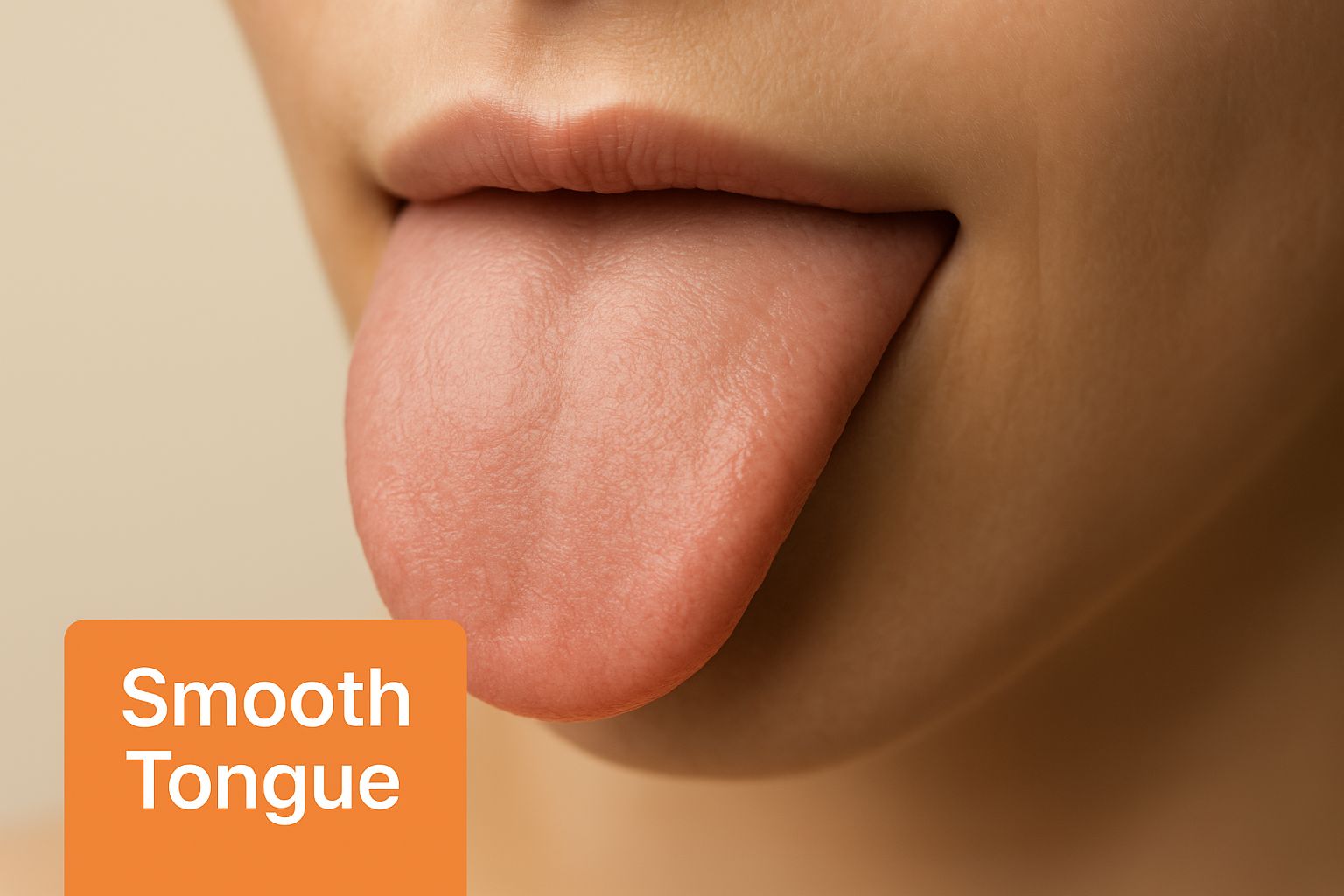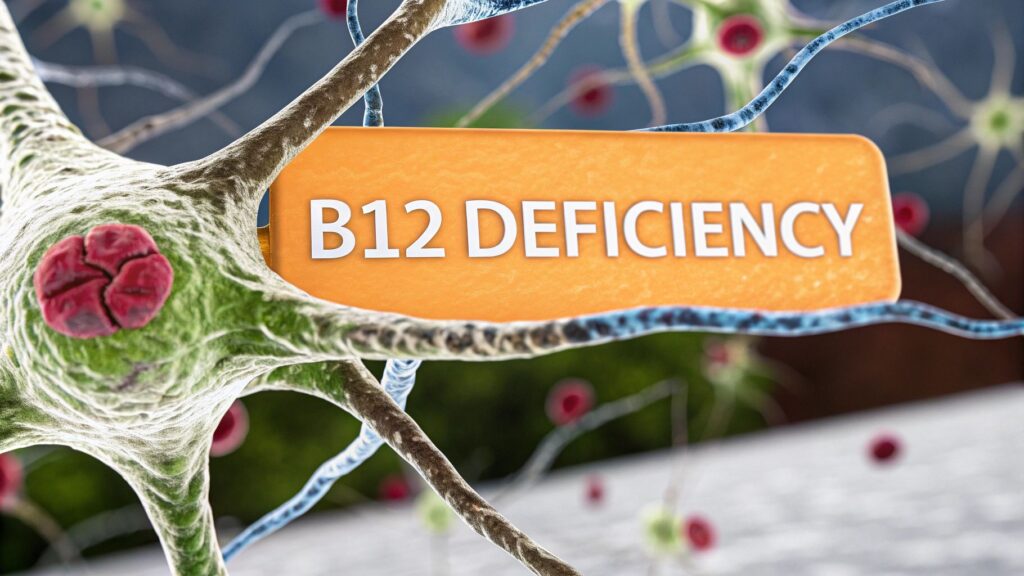That persistent brain fog and unshakeable fatigue you're feeling? It might be more than just stress or a busy schedule. The classic symptoms of a vitamin B12 deficiency—like constant tiredness, a pins-and-needles sensation in your hands and feet, memory lapses, and even mood swings—often get brushed off as just part of a demanding life.
The Subtle Signs of Vitamin B12 Deficiency

It’s a story I hear all the time: you get a full eight hours of sleep but still wake up feeling like you've barely rested. You struggle to focus at work, and a general sense of mental and physical exhaustion follows you around all day. It’s so easy to blame overwork or just getting older, but these feelings could be your body’s early warning system for a serious nutrient shortfall.
Vitamin B12 is absolutely essential for keeping your nerve cells healthy and for producing the red blood cells that carry oxygen everywhere in your body. Think of B12 as the spark plug for your body’s engine; without enough of it, performance plummets. This leads directly to that profound fatigue and mental sluggishness. When your levels are low, your nervous system can't communicate properly and your energy production just grinds to a halt.
Recognizing these varied signs is the very first step toward figuring out what's really going on. Because the symptoms can pop up all over the place—affecting everything from your mood to your sense of balance—it helps to see them grouped together. This gives you a much clearer picture of how a single deficiency can throw your entire system out of whack.
Quick Guide to Common B12 Deficiency Symptoms
To make sense of how widespread the effects can be, this table breaks down the most common symptoms into their respective categories. It can help you connect the dots between what you're feeling and what might be happening internally.
| Symptom Category | Common Examples |
|---|---|
| Neurological & Psychological | Tingling or numbness in hands/feet (pins and needles), memory issues, confusion, depression, poor balance. |
| Physical & Hematological | Chronic fatigue, muscle weakness, pale or jaundiced skin, shortness of breath, a sore or swollen tongue. |
| Other Subtle Signs | Vision disturbances, mood swings, unexplained weight loss, mouth ulcers. |
Seeing the symptoms laid out like this makes it clear that B12 deficiency isn't just about feeling tired. It's a systemic issue that requires attention to prevent more serious, long-term problems. If several of these sound familiar, it’s a strong signal that it's time to talk to a healthcare provider.
Why Your Body Can’t Function Without Vitamin B12
Think of Vitamin B12 as the behind-the-scenes crew chief for your entire body. It’s an essential nutrient that handles several critical jobs, and when it’s not around, the whole system can start to break down. Without enough B12, your body simply can't build, repair, or energize itself properly, which is why the symptoms of a deficiency can feel so widespread.
One of its most important roles is keeping your nervous system healthy. B12 is absolutely crucial for producing the myelin sheath, a protective fatty coating that insulates your nerve fibers. Imagine an electrical cord with cracked or frayed plastic; the signal becomes weak, unreliable, or shorts out completely. When B12 is low, your nerve signals can misfire, leading to strange symptoms like tingling, numbness, and persistent brain fog.
The Building Blocks of Life Itself
Beyond just nerve health, B12 is a star player in two other fundamental processes. First, it’s essential for DNA synthesis—the actual blueprint your body uses to create every new cell. This has a direct impact on your ability to produce healthy red blood cells, which are responsible for carrying oxygen from your lungs to every single tissue in your body.
When B12 levels plummet, your body starts making large, immature, and ineffective red blood cells. This condition, known as megaloblastic anemia, means less oxygen is getting where it needs to go, leading to that profound, bone-deep fatigue and weakness. B12 also helps your body convert the food you eat into glucose, giving you the raw energy you need to get through the day.
Vitamin B12 is far more than a simple energy booster; it's a foundational nutrient for neurological function, red blood cell formation, and DNA synthesis. A deficiency interrupts these core processes, explaining its widespread impact on both physical and mental well-being.
Ultimately, every tingling sensation, moment of forgetfulness, or wave of exhaustion can be traced back to these core functions. For those looking to address a deficiency, understanding the different treatment options is key. You can learn more about the benefits of B-12 injections to see how they directly support these vital systems.
The Neurological and Psychological Signs You Can’t Ignore

While feeling tired is a common complaint, the most unsettling symptoms of a vitamin B12 deficiency are often neurological and psychological. These signs can be genuinely alarming because they mess with how you think, feel, and move through the world.
Think of the nerves running through your body as electrical wires. Vitamin B12 is essential for building and maintaining their protective coating, a fatty layer called the myelin sheath. When you’re low on B12, this insulation starts to wear thin and fray—a process called demyelination.
This damage causes the electrical signals from your brain to short-circuit or misfire, leading to a whole host of confusing and frightening symptoms.
From Pins and Needles to Brain Fog
This breakdown in neural communication can show up in several ways, hitting both your physical sensations and your mental clarity. The symptoms often creep in subtly but can become progressively worse if the deficiency isn't corrected.
You might start to notice things like:
- Paresthesia: That persistent "pins and needles" feeling, numbness, or a strange burning sensation in your hands, legs, or feet. It can make everyday tasks, like buttoning a shirt or even just feeling the ground beneath you, surprisingly difficult.
- Ataxia: A noticeable decline in your balance and coordination. You might find yourself stumbling more often or feeling unsteady, as if your body is no longer listening to your brain's commands.
- Cognitive Issues: This is a big one. It covers memory loss, general confusion, and an inability to concentrate. These problems all feed into what many people describe as a debilitating brain fog, which can seriously disrupt your daily life. You can learn more about what causes brain fog in our detailed guide.
The neurological and psychological signs of B12 deficiency are not just "in your head"—they are the direct, physical consequences of nerve damage. Recognizing them as medical symptoms is the first step toward getting the right diagnosis and treatment.
These symptoms often mimic other neurological disorders, and their severity can vary wildly depending on the person and how low their B12 levels are. In severe cases, this deficiency can cause serious neuropathy, marked by numbness and balance problems from the ongoing nerve demyelination.
Recognizing the Physical and Hematological Signs
Beyond the neurological fog, some of the most telling signs of a vitamin B12 deficiency show up physically, especially within your bloodstream. When B12 is in short supply, your body can't produce healthy red blood cells, which can lead to a condition called megaloblastic anemia.
Think of your red blood cells as a massive fleet of delivery trucks carrying oxygen to every corner of your body. Without enough B12, the factory—your bone marrow—starts churning out oversized, fragile, and inefficient trucks. These massive cells struggle to navigate tiny blood vessels and don't last very long, meaning your body’s entire oxygen delivery service becomes slow and unreliable.
This internal breakdown is why you might feel a deep, persistent fatigue that no amount of sleep can fix. Simple things, like climbing a flight of stairs, can leave you feeling completely winded and weak because your muscles and organs are literally starved for the oxygen they need to work properly.
Visible Clues and Oral Symptoms
The fallout from poor red blood cell production often appears in ways you can actually see. Your skin might become pale or even take on a slightly yellow (jaundiced) tint. This happens because those fragile, oversized red blood cells break down too quickly, releasing a yellow pigment called bilirubin into your bloodstream.
Another classic sign often shows up in the mouth. One of the most distinct oral indicators is a condition known as glossitis.
This is when the tongue becomes visibly smooth, sore, and sometimes swollen and red.

That smoothness happens because the tiny bumps on your tongue, called papillae, can actually shrink and disappear, changing its whole texture. Along with a sore tongue, you might also find yourself dealing with recurrent mouth ulcers.
These physical and hematological signs are not just minor annoyances; they are direct indicators of a deep cellular problem. Recognizing fatigue, pale skin, or a smooth tongue as potential vitamin B12 deficiency symptoms is crucial for seeking timely medical advice.
By connecting these tangible feelings to what’s happening on a biological level, you can have a much more informed conversation with your doctor about your health and whether it’s time for blood tests.
Who Is Most at Risk for B12 Deficiency?
While anyone can develop a vitamin B12 deficiency, certain lifestyles and health conditions can put you squarely in the high-risk category. It's not always about what you're eating; sometimes, the problem lies in how your body can—or can't—absorb this vital nutrient.
Understanding these risk factors is the first step toward being proactive. For some, it’s about dietary choices, but for many others, issues with digestion or even just the natural process of aging are the real culprits.
Age and Dietary Choices
One of the biggest risk factors is simply getting older. As we age, our stomachs tend to produce less of the acid needed to pry vitamin B12 loose from the protein in our food. Without enough stomach acid, you can eat a B12-rich diet and still not absorb enough of it. It’s a classic case of the nutrient being present but not accessible.
Diet is the other major piece of the puzzle. Vitamin B12 is found almost exclusively in animal products—think meat, fish, eggs, and dairy. This puts anyone following a strict vegan or vegetarian diet at a very high risk. Unless they are diligent about consuming B12-fortified foods or taking a reliable supplement, a deficiency is almost inevitable.
Vitamin B12 deficiency is a global issue that rises sharply with age. In developed nations like the U.S. and U.K., about 6% of people under 60 are deficient, but that figure jumps to 20% for those over 60. This is often due to reduced absorption and a higher prevalence of conditions like pernicious anemia. To learn more, you can read the full breakdown of these vitamin B12 health statistics.
A quick look at global deficiency rates shows how much geography and local diets can influence B12 levels.
Vitamin B12 Deficiency Prevalence by Region
This table compares reported deficiency rates across different parts of the world, highlighting the impact of regional dietary patterns on B12 status.
| Region | Reported Deficiency Prevalence |
|---|---|
| North America & Europe | 3-26% (Higher in older adults and vegetarians) |
| Latin America | Up to 40% in some populations, linked to diet |
| Africa | Up to 70% in some areas, especially among children |
| Asia (parts of India) | Up to 70-80% in populations with low animal product intake |
As you can see, rates can be alarmingly high in regions where plant-based diets are common and access to fortified foods is limited.
Medical Conditions and Surgeries
Beyond age and diet, a number of medical conditions can throw a major wrench in your body's ability to absorb B12. If your digestive system is compromised, you are automatically at a higher risk.
These conditions create significant barriers to absorption:
- Crohn's Disease and Celiac Disease: Both conditions cause serious inflammation in the gut. This inflammation can damage the specific part of the small intestine that’s responsible for pulling vitamin B12 into your bloodstream.
- Weight-Loss Surgery: Procedures like gastric bypass physically alter the digestive tract. This can dramatically reduce your stomach’s ability to produce acid and a critical protein called intrinsic factor, which is essential for B12 absorption.
- Pernicious Anemia: This isn't your typical anemia. It’s an autoimmune disorder where the body’s own immune system attacks the stomach cells that make intrinsic factor. Without it, absorbing B12 from food is virtually impossible.
How to Diagnose and Treat B12 Deficiency
If you’re nodding along to the symptoms we’ve talked about, the next logical step is getting a proper diagnosis. This isn't something you can guess at. The process almost always starts with a conversation with your doctor, who will then order blood tests to get a clear picture of what's going on.
The first test is usually a serum B12 test, which measures the total amount of the vitamin floating in your blood. But this test doesn’t always tell the whole story. To get a more accurate look, a doctor might also order a methylmalonic acid (MMA) test, which reveals how well B12 is actually working inside your cells.
Finding the Right Treatment Path
Once a deficiency is confirmed, the goal is simple: get your B12 levels back where they need to be. The right way to do this depends entirely on why your levels are low in the first place. Is it a gap in your diet, or is your body struggling to absorb the vitamin?
Common treatment options include:
- Oral Supplements: High-dose B12 tablets are often the first line of defense for people with a dietary shortfall, like many vegans and vegetarians.
- B12 Injections: For those with absorption problems—like pernicious anemia or Crohn's disease—injections are the standard. They bypass the digestive system completely, delivering B12 directly where it’s needed.
- Nasal Sprays: A less common but still effective option, these sprays offer another way to get B12 into the bloodstream without relying on the gut.
Correcting a vitamin B12 deficiency is not just about taking supplements; it's about understanding and addressing the underlying reason for the low levels to ensure long-term health and prevent a recurrence.
For anyone looking to get a definitive answer about their own vitamin status, comprehensive testing for vitamin deficiency is the most reliable starting point. It’s also important to realize this isn't a rare problem. B12 deficiency is a significant global health issue, with some studies showing rates as high as 44.6% in certain groups of patients. You can read more about these global vitamin B12 deficiency findings to see the bigger picture.
Ultimately, figuring out the "why" is the key to a treatment that actually works for the long haul.
Of course. Here is the rewritten section, crafted to sound like a human expert while following all your detailed requirements.
Your B12 Deficiency Questions, Answered
Even after getting the basics down, you probably still have some practical questions floating around. That’s completely normal. Let's tackle some of the most common ones I hear from clients, so you can move forward with a clearer picture of what to expect.
How Long Does It Take To Recover?
This is the big question, and the honest answer is: it depends. Your recovery timeline is tied directly to how severe the deficiency was and how long it went on before you started treatment.
Many people feel a noticeable difference in their energy levels and overall fatigue within the first few weeks. It’s often the first sign that things are moving in the right direction.
Neurological symptoms, however, are a different story. Things like memory fog or that frustrating "pins and needles" sensation heal much more slowly because nerves take a long time to repair. You’re looking at a timeline of several months, sometimes even up to a year, to see significant improvement. If a deficiency was left untreated for years, some of that nerve damage can, unfortunately, be permanent—which is why catching it early is so incredibly important.
Can a Vegan Diet Really Provide Enough B12?
Since Vitamin B12 is found almost exclusively in animal-based foods like meat, eggs, and dairy, it's virtually impossible to get what you need from plants alone. This puts anyone on a strict vegan or even a vegetarian diet at a very high risk.
If you follow a plant-based diet, you absolutely must supplement. Consistently taking a reliable B12 supplement and eating B12-fortified foods isn't just a good idea; it's essential for avoiding deficiency.
For anyone eating a plant-based diet, proactive supplementation is non-negotiable for long-term health. I also strongly recommend regular check-ins with your doctor to monitor your levels and make sure you’re staying in a healthy range, long before any vitamin B12 deficiency symptoms can take hold.
Are Supplements Better Than Injections?
One isn't "better" than the other; the right choice comes down to why you're deficient in the first place. This is definitely not a one-size-fits-all situation.
- Oral Supplements: If your deficiency is simply because you're not getting enough B12 from your diet, high-dose oral supplements are usually very effective. They work perfectly well when your gut can absorb the vitamin properly.
- Injections: If your body can't absorb B12 from your gut—due to a condition like pernicious anemia or after you've had gastric surgery—injections are the only way to go. They completely bypass the digestive system and deliver B12 straight into your bloodstream where your body can use it immediately.
At Elite Bioscience, we provide streamlined access to therapies that support your overall well-being. Explore our injectable vitamin options to find the right support for your health goals. Learn more at https://elitebioscience.co.







